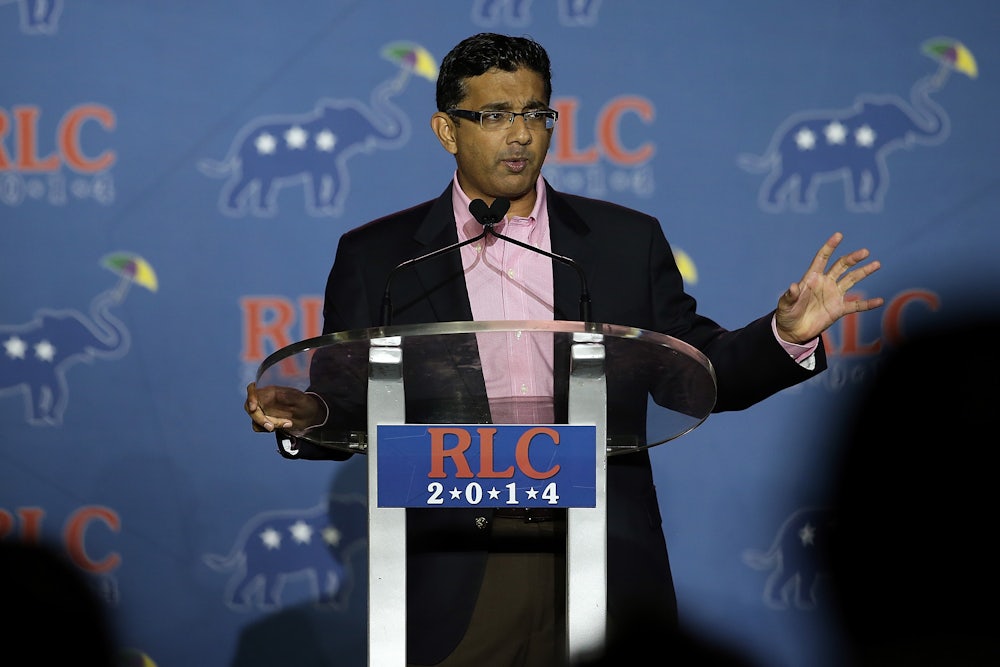Conspiracy theorist, bestselling author, convicted felon: Dinesh D’Souza has worn many hats in his life. He can now add a presidential pardon to his distinguished resume, after Donald Trump announced that he would wipe D’Souza’s record clean. In a tweet, Trump claimed that D’Souza had been “treated very unfairly by our government!” But there is no doubt that D’Souza actually committed his crime, pleading guilty in 2014 to violating campaign finance laws, for which he received community service and a $30,000 slap on the wrist. Trump’s pardon cements D’Souza’s self-proclaimed status as a martyr—he has since claimed that he was persecuted for his conservative political views—and it also reveals the beating heart of conservatism in 2018. Like, after all, knows like. Grifter respects the grift.
It’s easy to forget that D’Souza, who in recent years has become best known for his attacks on Barack Obama’s “anticolonial” agenda and his thesis that Democrats are the real racists, once enjoyed a certain gravitas. He graduated from Dartmouth College. He became the president of The King’s College, a Christian school based in New York City. He wrote books—many books. And they were initially well-received. His 1991 debut, Illiberal Education: The Politics of Race and Sex On Campus, preceded our campus free speech wars by about a quarter-century. The Atlantic ran an excerpt. C. Vann Woodward reviewed it, mostly positively, for The New York Review of Books. In Commentary, Joseph Adelson called it “the most complete study we have had of the capture and degradation of higher education by the Left,” and a “wonderful book.”
Even then, however, D’Souza’s academic rigor was gilt, not gold. Illiberal Education misconstrued facts and misrepresented history, as multiple academics complained to the New York Review at the time. And he’s hardly alone: The conservative intelligentsia is filled with scam artists like D’Souza, who are dressed up as serious thinkers when their real purpose is to attack the left, to defend a reactionary ideology and, increasingly, to simply troll. The grift continues today, from Kevin Williamson’s hiring at The Atlantic to The New York Times glorifying right-wing agitators as members of the “intellectual dark web.” Like Trump, who exposed the barrenness of the Republican Party’s political agenda, D’Souza revealed the true nature of the conservative movement’s intellectual apparatus; that he has been pardoned by Trump to trigger the libs only makes the connection explicit.
It can be difficult, even for conservatives, to defend D’Souza and other conservative intellectuals like Charles Murray (who has claimed that genetics can explain inequalities between races), Jordan Peterson (who once said that feminists have “an unconscious wish for brutal male domination”), and Ann Coulter (who wants to keep the immigrants out). One way is to skirt the substance of their arguments and turn them into free speech warriors engaged in the fight against liberal intolerance. D’Souza is an example of this dynamic at its most extreme, a pure tribal totem, and his pardon is expected to play well with Trump’s base in the conservative media.
The conservative defense of free speech disguises the fact that these thinkers are invested in protecting the status quo. And it is difficult for a defense of power to be truly contrarian; it is certainly not “iconoclastic,” as commentators like Bari Weiss have argued. To maintain the fiction that intellectual curiosity, and not reactionary sentiment, informs their arguments, conservatives gravitate toward what they believe to be the trappings of serious thinking: bow ties, purple prose, name-dropping. D’Souza, as usual, provides an extreme example. His former employer, The King’s College, adopted a European-style house system, where students can join the House of Margaret Thatcher or the House of Ronald Reagan, among other options. It also offers a politics, philosophy, and economics degree modeled in part after Oxford University’s famous program. (Alas for D’Souza, he was fired once his extramarital affair became public, one of the first indications his conservatism was something of an act.)
Conservatives are deeply invested in these fictions. For Biblical literalists, there’s creationism, which pretends to be science. The Christian owners of Hobby Lobby paid shoddy archeologists to create a Christian nation that doesn’t exist. Love journalism but hate the lugenpresse? There’s Breitbart or Fox News or Townhall. Want a college degree without the liberalism? Hillsdale College awaits your application. And if you’d like to disguise your appreciation for Ayn Rand with an intellectual veneer, you’re in luck: The gospel of supply-side economics could always use a few true believers.
There is an intellectual dark web in the sense that conservatives have constructed alternative institutions, economic theories, and thought leaders to fight egalitarianism. And it’s working: Trump is president, the GOP controls Congress, and Democrats are still scrambling to make up deficits in state legislatures and governors’ mansions. Granted, conservative ideas don’t necessarily enjoy the support of public opinion. Most Americans don’t want to ban abortion. Most support higher taxes on the rich. Most support government-provided health care. But conservatives are driven by other forces—resentment and racial anxiety, to name two—and that’s where “iconoclasts” like D’Souza come in. He is a propagandist, charged with the twin responsibilities of energizing the right-wing base and converting new recruits to its cause.
Liberals aren’t without their own scam artists, as the proliferation of #TrumpRussia mythologists proves. But grifters aren’t equally pernicious, and we know now that some grifters are more powerful than others. The president backs Dinesh D’Souza, and he did so because he sees something of himself in this professional troll. Both feed off resentment and fear. Both made a political career off conspiracy theories. Neither is interested in solving real social problems. They’re political creatures, all aesthetics and no substance.
Originally a purveyor of manicured lies, D’Souza became a purveyor of rowdier, laughably obvious lies. That trajectory, once launched, set him inevitably on a course to join Donald Trump. Their alliance is reflected in the conservative movement’s alliance with the GOP. If it has always been Trump’s party, it was always D’Souza’s movement.
